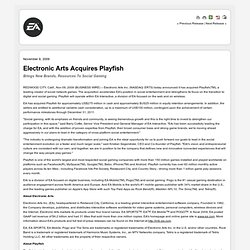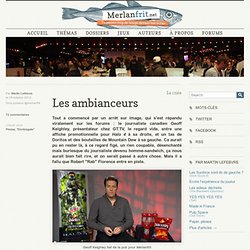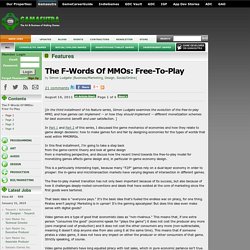

Farmville, la poule aux œufs d'or de Zynga. App Annie Index: There's Something About LINE. Riot Games' League Of Legends Officially Becomes Most Played PC Game In The World. UBISOFT® ACQUIRES OWLIENT AND HOWRSE BRAND, STRENGTHENING ITS FREE-TO-PLAY EXPERTISE AND PORTFOLIO. Paris, France – July 12, 2011 – Today, Ubisoft announced the acquisition of free-to-play game developer Owlient. The team at Owlient has extensive expertise in the management of online game-playing communities, and their Howrse brand has almost two million monthly active users. Founded in Paris in 2005, Owlient and their 40 team members is a forerunner in creating free-to-play games.
The company set itself apart for its ability to develop the expertise and technology necessary to manage and entertain an online game community. "We are thrilled to welcome the talented team at Owlient to Ubisoft. Over the last five years they have developed an architecture dedicated to delivering and monetizing games as a service, as well as the skills of attracting and retaining online communities,” said Yves Guillemot, chief executive officer at Ubisoft. . © 2010 Ubisoft Entertainment.
. © 2010 Ubisoft Entertainment. . © 2011 Ubisoft Entertainment. . © 2011 Ubisoft Entertainment. Electronic Arts Acquires Playfish (NASDAQ:EA) REDWOOD CITY, Calif., Nov 09, 2009 (BUSINESS WIRE) -- Electronic Arts Inc.

(NASDAQ: ERTS) today announced it has acquired Playfish(TM), a leading creator of social network games. The acquisition accelerates EA's position in social entertainment and strengthens its focus on the transition to digital and social gaming. Playfish will operate within EA Interactive, a division of EA focused on the web and on wireless.
EA has acquired Playfish for approximately US$275 million in cash and approximately $US25 million in equity retention arrangements. In addition, the sellers are entitled to additional variable cash consideration, up to a maximum of US$100 million, contingent upon the achievement of certain performance milestones through December 31, 2011. Playfish is one of the world's largest and most respected social gaming companies with more than 150 million games installed and played worldwide on platforms such as Facebook(R), MySpace(TM), Google(TM), Bebo, iPhone(TM) and Android. Communiqués de presse. Xbox Creator Speaks On Ouya - Features. Guillemot: As many PC players pay for F2P as boxed product.
Ubisoft CEO Yves Guillemot has told GamesIndustry International that the percentage of paying players is the same for free to play as it is for PC boxed product: around five to seven per cent.

Speaking to GamesIndustry International editor Matt Martin at Gamescom, Guillemot revealed that free to play has been an effective way for Ubisoft to market product to territories in which PC gaming had been so badly affected by piracy that profit was impossible. "We want to develop the PC market quite a lot and F2P is really the way to do it," said the French CEO. "The advantage of F2P is that we can get revenue from countries where we couldn't previously - places where our products were played but not bought.
Now with F2P we gain revenue, which helps brands last longer. "It's a way to get closer to your customers, to make sure you have a revenue. "We also take content which we've developed in the past, graphics etc, and we can make cheaper games and improve them over time. L'indépendance des sites de jeux vidéo en question. L'indépendance des journalistes est souvent remise en question, en France comme à l'étranger.

Une problématique qui revient encore plus régulièrement lorsqu'il s'agit de sites très spécialisés, souvent liés à des secteurs très concernés par la publicité. C'est le sujet du dernier Arrêt sur images, qui a récemment invité quatre journalistes des plus grandes rédactions françaises de jeu vidéo. Étaient invités le rédacteur en chef de Gamekult, Gaël "Poischich" Fouquet, ainsi que le co-fondateur de Gameblog, Julien Chièze. Jeuxvideo.com n'était bien sûr pas oublié et représenté par le chroniqueur Usul. Les ambianceurs. Tout a commencé par un arrêt sur image, qui s’est répandu viralement sur les forums : le journaliste canadien Geoff Keighley, présentateur chez GT.TV, le regard vide, entre une affiche promotionnelle pour Halo 4 à sa droite, et un tas de Doritos et des bouteilles de Mountain Dew à sa gauche.

Ca aurait pu en rester là, à ce regard figé, un rien coupable, désenchanté mais burlesque du journaliste devenu homme-sandwich, ça nous aurait bien fait rire, et on serait passé à autre chose. Mais il a fallu que Robert "Rab" Florence entre en piste. Geoff Keighley fait de la pub pour Merlanfrit. Analyse comparative des notes de jeux vidéo de la presse. On Games, Reviews, And Criticism. When Simon Parkin published his review of Uncharted 3: Drake’s Deception at Eurogamer, a mild firestorm erupted, launching a contentious debate about the role of criticism during the review process.

Parkin’s review took issue with the Uncharted design philosophy as a whole, but still awarded the game an 8/10 at the bottom of the page--a respectable score from an outlet as tough as Eurogamer! Fans, developers, and even some writers wondered aloud whether Parkin had picked the appropriate venue for his examination of Naughty Dog’s choices. I wrote my own piece about the ensuing response, which prompted a more intimate conversation about the subject with game developer Manveer Heir, who is currently a senior designer on Mass Effect 3 at BioWare Montreal. Heir has been kicking around the industry for a while now, having landed at BioWare Montreal and the Mass Effect series after five years with Raven Software in Wisconsin, the home state of my dearest football rivals.
On Games, Reviews, And Criticism. What it means to be a critic, one's approach to being critical, and how that relates to the larger idea of "criticism" versus a traditional "review" are topics that any writer or developer will give you endless opinions on.

Mass Effect 3 senior designer Manveer Heir and I have been exploring this idea, a conversation prompted by the vocal response to Simon Parkin's Uncharted 3: Drake's Deception review, which served as a review of Uncharted 3 and the entire Uncharted series. The response was overwhelmingly positive last week, and that makes me awfully happy. You'll see more of this--promise. In part two, we contemplate whether dropping review scores, which some publications have tried, could be a potential solution. On Games, Reviews, And Criticism. If the past few days has evidenced anything, it's that readers take reviews just as seriously as writers, developers and publishers.

That's awfully important, too; ostensibly, you're what this is all about, right? I've thoroughly enjoyed reading hundreds of comments from readers responding to my conversation with Mass Effect 3 senior designer Manveer Heir, who should be commended for throwing himself pie-first into the flames. There aren't many developers willing to take this kind of risk, but I'm hoping the great reaction from players means I'll be able to convince some other developers, too. Maybe you're one of those developers. The Real Problem With Video Game Reviews. Interview: The Rise of Free-To-Play At EA. The last time Gamasutra spoke to Ben Cousins, general manager of Electronic Arts' new free-to-play team, was a little over two years ago.

At that time he was a producer at the company's DICE studio and was working on the then-yet-to-be-released free-to-play title Battlefield Heroes. It appears the experiment paid off -- enough so that Cousins is now the general manager of EA's free-to-play division, which has recently released Lord of Ultima, the first new game in the Ultima series in many years. What Gamers Think About Microtransactions. [As game developers grapple with making microtransactions more appealing to Western gamers, Daniel Kromand talks to core gamers to gauge the effectiveness -- and ineffectiveness -- of current microtransaction practices.]

This spring, I interviewed a group of gamers in free-to-play online games on the topic of microtransactions. The interviews were meant to identify how the gamers determined the value of microtransacted goods, what item designs they approved, and generally how they perceived microtransactions in their respective game. The F-Words Of MMOs: Free-To-Play. [In the third installment of his feature series, Simon Ludgate examines the evolution of the free-to-play MMO, and how games can implement -- or how they should implement -- different monetization schemes for best economic benefit and user satisfaction. ] In Part 1 and Part 2 of this series, I discussed the game mechanics of economies and how they relate to game design decisions: how to make games fun and fair by designing economies for the types of worlds that exist within MMORPGs.

In this final installment, I'm going to take a step back from the game-centric theory and look at game design from a marketing perspective, and discuss how the recent trend towards the free-to-play model for monetizing games affects game design and, in particular in-game economy design. This is a particularly interesting topic, because many "F2P" games rely on a dual-layer economy in order to prosper: the in-game and microtransaction markets have varying degrees of intersection in different games.
Virtual Goods - An Excerpt from Social Game Design: Monetization Methods and Mechanics. Virtual Goods - An Excerpt from Social Game Design: Monetization Methods and Mechanics [This text, on the crucial aspects of virtual goods design, is an extract from the ninth chapter of Social Game Design: Monetization Methods and Mechanics, by Tim Fields (Certain Affinity) and Brandon Cotton (Portalarium). In the book, the two authors closely examine how social games function as a player-responsive business.] The very phrase "Virtual Goods" is something of a delightful contradiction. Anything "virtual," by definition, doesn't physically exist, and goods, at least when appearing within the context of the marketplace, are typically an article of trade.
For our purposes, though, virtual goods are real enough that they generate billions of dollars in revenue each year, and are so important to players that they can drive binge play sessions, provoke real-world fights, create (and destroy) marriages, and keep users spending money twenty-four hours a day, in almost every country in the world. 7 Ways to Fail at Free-to-Play. Working in the free-to-play space on mobile is a real challenge, and building a great business model is an integral part of the process of developing games. Developer Aaron San Filippo talks about the bumps in the road he faced in the transition.
When my brother Forest and I started Flippfly, we struggled for a long time over the pricing strategy for our first project, an ios "Edutainment" app called Monkey Drum. On one hand, it was unique (it's a combination of a musical sequencer with 3D characters) and it had great production values that would, in theory, set it apart from the average iOS entertainment app. This is the future of free-to-play. The free-to-play business model has seen its share of success, but what will the next generation of free-to-play bring? At GDC Online in Austin, game developers told us how they expect free-to-play to evolve, how it will shape the way people make games, and how people will play them. "Where free-to-play is going is massive, global games, made by very small groups of people that can get onto a billion phones and, essentially, make a lot of money.
Building better communities: The next challenge for free-to-play. The free-to-play business model has seen a lot of success, but game developers still have their work cut out for them to bring free-to-play into the next generation. Gabe Leydon, CEO of iMob and Jet Fighters mobile developer Machine Zone, told Gamasutra at GDC Online about the next step for free-to-play. "Most of the advancements right now [in free-to-play], I would say, are in community," Leydon said. Le game design des Free-to-Play (1ère partie) Le Game Design des Free-to-play - Seconde partie. Le game design des Free-to-Play (3ème partie) Le game design des Free-to-Play (4ème partie)
The Design of Free-To-Play Games: Part 1. When we talk about free-to-play games, we are not talking of a new genre, but instead of a deep revolution that is affecting most aspects and actors of the game industry: marketing, publishing, hardware manufacturers, and of course, designers and developers. Free-to-play (F2P) is here to stay. That is good news; it is expanding the number of people who play games, it is stimulating the industry after a slow-down, and it gives us the opportunity to create new gaming experiences for players.
The Design of Free-to-Play Games, Part 2. [The rise of the free-to-play business model has drastically changed the landscape of game development. In his last feature, designer Pascal Luban described the conventional wisdom around the process. In this follow-up, he takes a deeper look at the design elements which free-to-play elements designers can address and looks at future trends.] Ubisoft: Free-to-play will affect all of our games. AAA games shifting to free-to-play, says Happy Wars dev. Free Apps Account For 89% Of All Downloads; Most Of The Rest Under $3; iOS Store Biggest Of Them All. The Free-To-Play Storm and the Freecore Gamer. The San Francisco Games Revolution Is Over. Zyngapocalypse Now (And What Comes Next?) Not Safe. Why Mobile Social Games Are Just As Vulnerable As Zynga. Www.ipsos.fr/sites/default/files/attachments/communiquejeuxvideogametrack2012.pdf.
F2P market is worth £216m in UK. Misc.